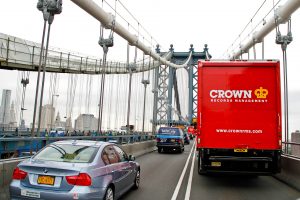
Rainy days. When it is so dark and dull outside that you would rather be snuggling down into your warm bed than engaging into whatsoever activity. The rain drops on my window were performing a truly dramatic acoustic spectacle when the alarm rung. There was not a single ray of light, the sun was hidden behind a veil of misty clouds and the wind was just brutal. When I stepped outside my hotel, the whole world had went into a fast forward motion, everybody around me was in a huge rush.

With Tony Valentine, VP Operations, North America at Crown Worldwide Group.
I couldn’t care less about how gloomy the weather was, because I was in the city with a capital “C” – New York, and I was going to meet with one of the largest international moving companies. I was in my empire state of mind, but despite my fierce determination to go that meeting, it turned out that the road to the Crown Relocations head office was under water. Mr Tony Valentine couldn’t reach the office and nor could I. After all, the road was flooded. It is in such situations when your motivation and dedication are being tested. It made me realize how much I love my job.
And it takes two to tango. When two people love their jobs, they would do the impossible to finish any business task. I am glad that we agreed to reschedule the interview for the following day, hoping that the road to the office would be functional. The following day the apocalyptic was a little bit less apocalyptic and we managed to reach the US main branch of Crown Relocations. Although my clothes and hair were soaking wet, I was still operational and I was full of excitement about the rendezvous.
After a brief educational tour inside Crown Relocation’s warehouse, we had to start the interview with Tony Valentine. Jennifer Harvey had to join us via a conference call, because she had to be in Connecticut and she couldn’t attend the interview.
Mr. Valentine, to begin with, can you please tell us a bit more about the history of Crown Relocations?
Tony Valentine: The founder, Jim Thompson, who is still the chairman and the sole shareholder, started the company in 1965, in Yokohama. He was living in Japan because his family moved there to work for the U.S. Military. He noticed an opportunity to target corporate customers and he decided to start his own moving business in a way that he was really focused on achieving high quality. And so, he has built the business from humble beginnings to a company that is in 60 locations around the world.
We are now headquartered in Hong Kong, but I wouldn’t describe ourselves as an Asian company or a Hong Kong company. We are a truly global company.
You said that quality is at the core of your business, how do you ensure your customer service is top notch?
Tony Valentine: I can take a whole day to answer this question, but to simplify it, quality is at the heart of everything we do and the customer is at the heart of everything we do.
Probably the main thing is communication. It is the key to good customer service. Communication has to be proactive, timely and honest. And if you get those things right, you usually are going to have a really good experience for the customer. What we try to instill in our team members all around the world is that when you communicate with the customer, try to walk in the customer’s shoes and think about what is going on for them in a very stressful time of a moving. Think about how you can make things a little bit easier and smoother for the customer.
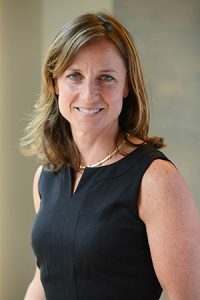
Jennifer Harvey, Managing Director, North America at Crown Worldwide Group.
Of course quality doesn’t just come from communication. The real key to a quality experience is the training that we do. We do a huge amount of training for every employee in our organization.
It all starts with the moving crews. We have a “Customer Service in the Home” as a training package for our movers and drivers, along with the traditional things of actual wrapping, packing, loading and delivering. There is video, there is classroom exercises and e-learning. All of this training is consistent throughout all of our international offices.
For our movers, we have the “Crown Touch” training program with videos and in-class workshops and all those materials are utilized by all of our movers all around the world.
From a management perspective, we have a robust reporting system to monitor the quality. I can look in the system any time and see what the quality scores are for a branch, or for a country and for the company altogether. We also use those quality scores a little bit as a friendly competition between each operational location. The competition is good, because it always makes you want to be on top.
The quality scores are a good way to benchmark. There are 4 or 5 categories that make the quality scores. There is the customer feedback, claims scores and billing accuracy. Each of these categories has a scoring system.
If we learn how to avoid certain pitfalls or how to improve some steps in the customer service at one operation center, we can share it automatically with the rest of the international operation centers. As long as we keep the customer at the core of the decision-making processes, then we get it right most of the time.
We can offer anything that is remotely related to the relocation process. The common things are the utility hookups, crating and assembling of items, and beyond that we can provide home search, school search, cultural training, and immigration support.
What are the greatest concerns for the consumer during the move process?
Tony Valentine: Everyone has their own special concerns and for the most part our customers are very experienced and knowledgeable. Generally speaking, they all have some items that are really valuable to them and we want to ask about those items early on. We want to make sure that it is recorded and shared with every person who is going to touch the move. This way we confirm that the special items get that extra care and attention. It doesn’t matter what the dollar value of the item is. If it is precious to the customer and they see that we are handling it with extra care, and they see that we are communicating that importance to each of our team members, I think it gives the customer a real peace of mind. That helps them reduce the stress and it makes our lives easier when we work with them.
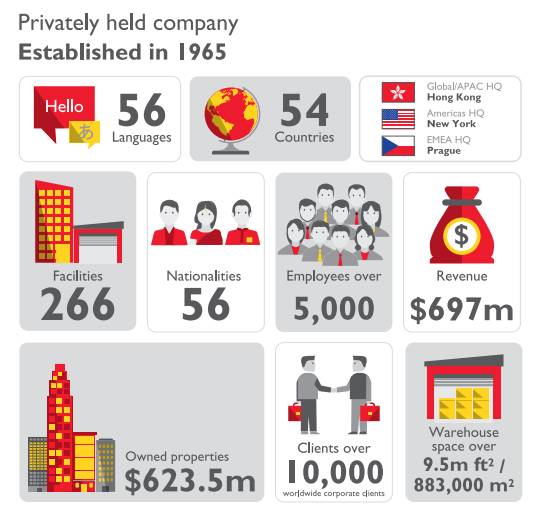
Infographic is based on 2016 data.
Another thing that is really important to customers, especially when we are talking about international relocation, is transit time. Everybody today is in a rush. They want everything now, but you cannot instantly teleport all of the household goods from one country to another. It is important to manage expectations regarding the transit time – how long will it take to pack, load, ship and move items through the customs clearance process. Therefore, right upfront we try to be very clear about what our customers can expect and we try to manage their expectations along the way, so they don’t get shocked or surprised.
As far as it concerns the customs clearance process, we advise our customers on the different regulations in each country and more importantly on what they can and cannot bring in the country. We inform the customer about possible red flags that some items might raise with some officials, which eventually will lead to more delays, inspections or even additional costs.
It is vital to be well informed about those customs requirements and to keep the customers informed, so they can make good decisions on what they are going to take with them and what they will leave behind.
What are some of the toughest regulations in the customs clearance process that you have to comply with? Which parts of the world have the strictest requirements?
Tony Valentine: Well, everything is a little bit different in each country. For example, moving into the US is very difficult, because there are extra steps that can cause delays and there are very tight security restrictions at the ports, x-rays of containers and all kind of random inspections.
Other countries may be more focused on quarantine and environmental challenges. Countries like Australia and New Zealand are very dedicated to protecting their environment and they have very strict requirements on import of items that may have been used in agriculture or gardening. The import of those is very closely monitored.
Some countries in the Middle East are very particular about what books you can bring in. They want to know what the topics are. You wouldn’t take any books or video on religion if you are moving to that region.
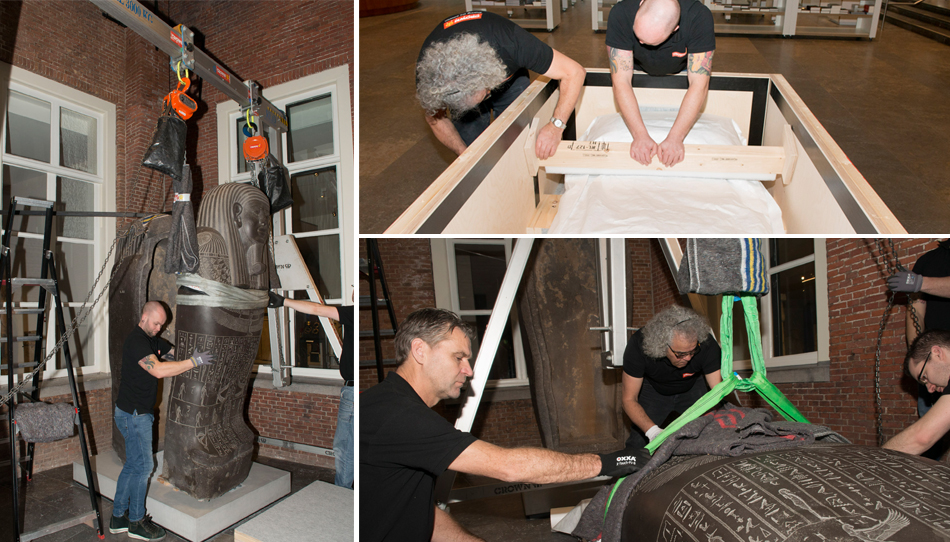
This Egyptian artefact was moved from its home at the Rijksmuseum van Oudheden (The National Museum of Antiquities) in Leiden to a temporary exhibition at the Getty Museum in Los Angeles. For the 5,000 mile journey, Crown Fine Art’s experts designed two special wooden crates that were long 8.5 ft. each in order to accommodate the two parts of the sarcophagus. Together both pieces weighed over 6600 lbs.
Like I said, each country has their own set of rules as to what you can import. That is why it is essential to share all that information with the customer. Everyone who is involved in the moving process should be aware of all those technicalities.
And how do you tackle feedback from consumers? What are your thoughts regarding online reviews?
Tony Valentine: Whatever our customers are saying about us online is important to us, whether it is a positive or a negative comment. What they are saying is what they believe is their side of the story and their perception is important for us to know. We monitor all the various places on the web that we can find that feedback and we respond to it, whether it is a good or a bad one.
We have a whole system in place to review the feedback that we receive from our customers and then we make recommendations for future improvements. There is a quality team that oversees the system globally. They are objective and neutral, and they make sure our reaction steps would be appropriate, before we engage in response.
The other good thing about the quality team is that they can spot trends. For example if there is a problem in one of our locations, or an opportunity of improvement, we can adapt and implement new solutions to all other locations.
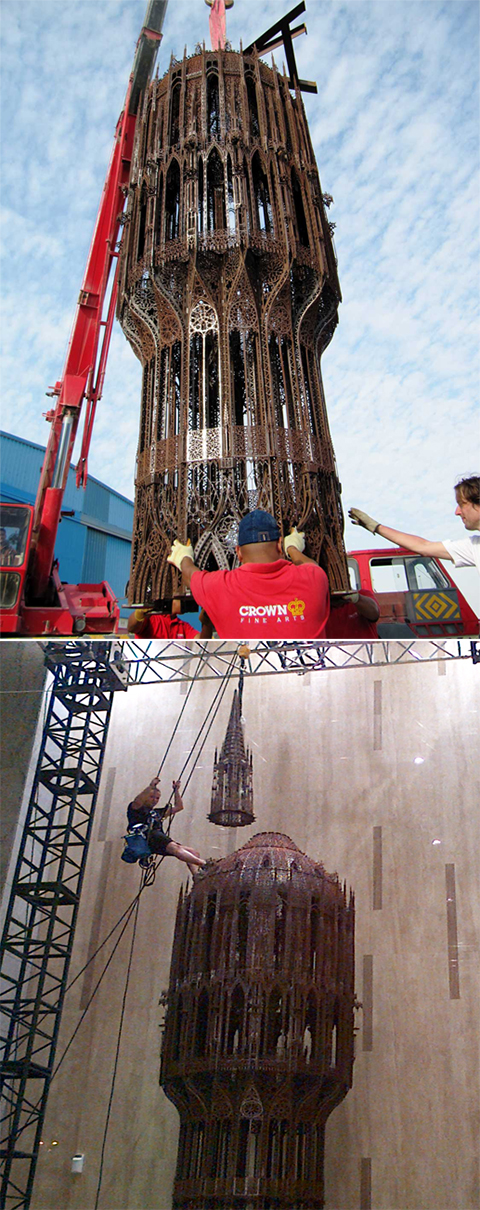
This sculpture was shipped by Crown Fine Art from Belgium to Dubai where it was installed in 23 Marina Tower. Working with winches and the gantry superstructure, the team layered carefully the separate sections of the work onto one another, securely bolting each stage to its subordinate. To secure the pinnacle, the team used ropes and a rigger suspended from the gantry.
What technology do you use in your business processes?
Tony Valentine: We use all sorts of technology and the one that is more common now is the virtual consultations. This technology provides the customer more than just a price, which is what the basic estimate is. We consult them on the whole moving process. We would help them with every situation to make sure that their move is as stress free as possible. Actually, the majority of our consultations are virtual and the customers love it. It is more convenient for our customers, because they get the video consultation at a time that is convenient for them.
Another important factor is that this virtual consultations are much better on the environment. We have less vehicles on the road, adding to the emissions and the congestion, because that service can be provided from the comfort of an office.
Learning and improving comes from mistakes. What are some of the biggest mistakes that you have done and how did you fix it?
Tony Valentine: Well, it is hard to think of a specific example, but the main thing is that mistakes drive our training programs, because it is usually a human error that is at the core of mistakes. It is generally the tweaks and the improvements to our training programs that come out of what our customers are telling us. That is how we learn the most. Sometimes, mistakes come from issues with packing materials and we have to adjust the material to be more robust or pick a different design, but mainly it is things like improving communication or managing expectations.
And one of the big things that our customers are telling us right now is that they don’t want to talk to us so much. They just want to be able to go online and get everything they need quickly and conveniently on their own time. They don’t want to wait for someone to get back to them on the phone. Therefore, we have recently created an online portal that allows customers to get there price proposal, to book their move and make changes to the move. They are still assigned to move managers, but they don’t have to talk to them anymore. Everything within the cycle of a move, from the booking to the customer feedback can now be done through the online portal. And that is innovation for us.
What are some of the greatest issues that we as an industry are faced up to and how do you tackle them?
Tony Valentine: Domestically there is the well-known driver shortage. Additionally there are increasing regulations that put pressure on work hours. We respect our drivers as independent business owners. They do a great quality job, but they are also running a business that needs to be profitable. We support them to not only execute the transportation of the goods, but also run the whole move process along with packing and loading. It’s best for the customer, because they will work with the same team on all phases of their move and then it is more business for our drivers as well. It is a win-win.
Also, we are finding it hard to find trucks and drivers in California, because the emissions laws in California are the strictest ones. Because of the high cost to comply with these laws, it is very expensive for independent van owners to run their business in that state. Some drivers just don’t go through California. That kind of laws put another level of pressure on the capacity of the industry, which is felt even more harshly in the summer. Those laws I am sure are good for the environment and we support the idea of making the world a better place. It is just that those laws do pose an operational and logistic challenge.
Jennifer Harvey: The high expectations in regard to the privacy of personal information is another challenge. We are seeing an increase in those expectations, especially from our corporate customers. We are GDPR compliant and this regulation is sort of even tougher compared to the requirements that we have in the USA. I think that this is a really important one, because whether you are a private individual who moves to another place or a business that relocates many employees, you care about the security of the personal information. I care about it.
Another key aspect of your business is corporate social responsibility. What are some of the nearest to your heart causes that you support?
Tony Valentine: One of the most near and dear charitable organization that we are proud to be a part of here in the USA is Move for Hunger. We have been partners with Move for Hunger for five years now. In that time we have donated more than 600,000 lbs. of food which equals to 527,000 meals. The good thing about this is that we are giving food back to the communities that we do business in, to the communities where our employees and customers live. We help the food banks that are close to us and that definitely feels good.
Another thing is that we let our employees to choose causes that are important to them. We encourage our employees to help their community so much that we put it in their goals each year. In 2017, there were over a hundred of our branches where our people actively participated in initiatives to give back to the community, whether it was donating to a food bank, or helping a shelter. Furthermore, as the employees in the different locations would work together as a team, that is a really good opportunity for teambuilding.
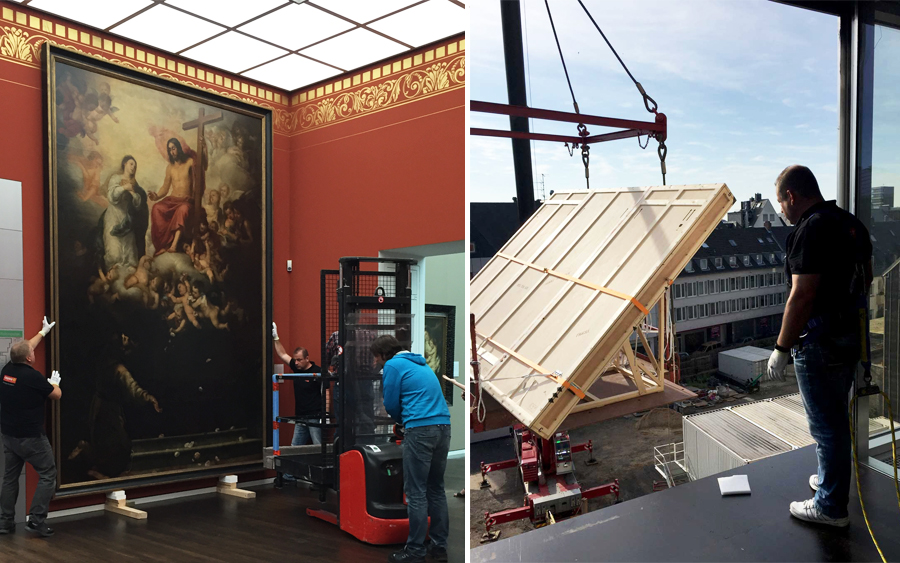
Crown Fine Art was responsible for packing and shipping this large-scale work from the Wallraf-Richartz-Museum in Cologne to the Museo de Bellas Artes de Sevilla in Spain. The extraordinary St. Francis in the Portiuncula Chapel by Bartolomé Esteban Murillo was created around 1665-1666 on canvas and is the largest painting of the Wallraf-Richartz-Museum in Cologne , Germany.
Jennifer Harvey: Another way that we try to have a positive impact in our communities and on the environment globally, is through increasing efficiency within each of our offices. We use packing materials, we run vehicles, and our large warehouses use a lot of electricity. We measure all that usage and we do monthly reports on the progress. We don’t want to penalize our branches when they do more business, our goal is to push them to be more efficient in doing their business. We are also part of the United Nation Global Compact where we have to submit improvements on those goals.
What is your message to all people who are about to move?
Tony Valentine: You get what you pay for. If something looks like it is a super great deal, it may not be. I would recommend the consumers to get service proposals in writing and look up the moving company and verify if they are compliant with the government regulations, if they are members of trade associations like AMSA and IAM, or likewise organizations in the other parts of the world. Customers want to make sure that the crews that will come to their home are properly vetted.
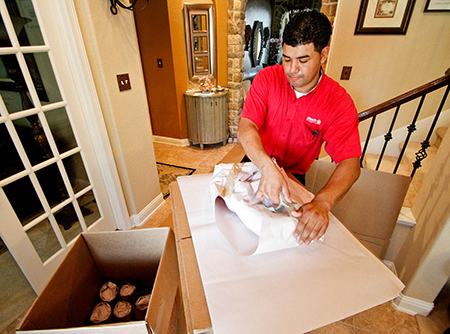
Professional packing by Crown Relocations employee.
As it concerns to other businesses in our industry, I would advise them to be an ethical organization, give a fair trade and care for the customer. It is good for us all. There is the bad element of rogue movers out there and they give us all a bad name. If we can all do our best to give a great customer service every time, we can remove that tarnished image from the public.
How do you see Crown Relocations evolve in the next years?
Tony Valentine: I think I mentioned it earlier, it is the customers who are changing and respectively driving innovations within our company. One of the things that we are seeing is that people are moving and storing less items. The move volumes have decreased and the customer is less willing to store items for a long period of time. We have become more of a disposal society. Things are thrown away and replaced, rather than kept and repaired. We need to adapt to that.
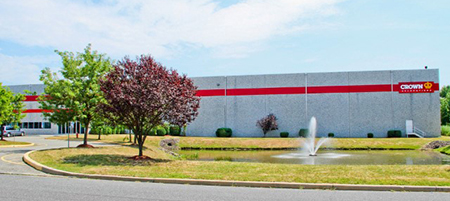
Crown Relocations main building in the USA.
Next, the customer expectations are growing at a fast pace. They expect fast response time and less human interaction. They just want to get the job done with the push of a few buttons, without having to talk to people and using all the traditional means of communication. That drives us to be more flexible through technology and with the technology we use, and also we need to be more flexible with the people who work for us.
We need to give employees autonomy to make decisions that are in the best interest for the customers and in the best interest for the company, rather than delaying the move process, because of the need of permissions. If employees have more autonomy, then they can meet the customer expectations for fast responses.
We also have what we call an e-packing system. The bar-coded labels that we use significantly facilitate the communications within all departments and locations in our company internally, and also with the customer. They can keep track of what items are on the move and where are they at any single point.
Jennifer Harvey: We think of our daily transactions, whether it would be banking or grocery shopping. Arguably, the moving industry has been slow to keep up with the innovations and so our goal would be to keep up with the new trends and the changing customer expectations. It has become harder for businesses to be sustainable, because now you have to be a lot of things to customers in different markets all over the world. It is an ongoing endeavor, because of the changing consumer demands.
What motives your work and why did you chose to stay in our industry? It is not the sexiest job to do?
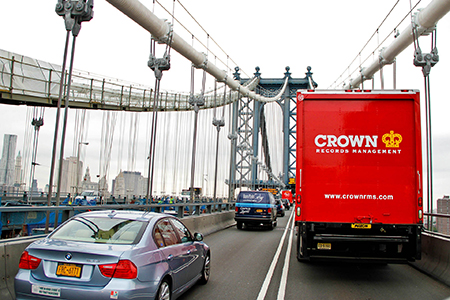
Crown Relocations truck spotted in New York.
Tony Valentine: It was kind of an accident how I started working for a moving company. Frankly, it is not something that most people think of when they are planning their lifetime career. For me, I have been working for Crown Relocations for more than 25 years now and it doesn’t feel that long, because of the many opportunities I have had so far, including relocation and seeing different parts of the world. I don’t think that it is as much as the lure of the industry, as it is working for a company where you feel valued, where you help other people and you never get bored.
Jennifer Harvey: Actually my father is the founder of the company and whereas my first job was not in this industry, you could say that I grew up in this industry. I guess you just get a little bit hooked. It is never stagnant – you get to work with so many interesting people and you get into so many different geographic markets, and the fact that Crown has multiple businesses is what kept me in the industry, rather than the family connection to the business. I love the diverse nature of what we do and I love the opportunities that come from the ever-changing landscape.